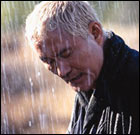Zatoichi by Takeshi
Kitano
Best Director Takeshi Kitano
 |
|
|
|
This is a film for cinephiles made by a
cinephile. Inspired by Kenji Misumi story and a series of
films by shown on Japanese television between 1962 and 1989
which celebrated the adventures of the eponymous blind samurai,
Zatoichi, directed by the inimitable Takeshi Kitano, is a
singular interpretation of the period film. In fact, it is
Kitanos first historical film. Set in 19th century Japan,
the framework of the story is traditional. Our hero- a masseur
and extraordinary swordsman masseur- helps two orphaned geishas
avenge the murder of their family by the Ginza gang. With
a nod towards Kurosawa, Zaitochi is, however, a thoroughly
post-modern and- ultimately- profoundly eccentric affair.
Our samurai icon- played by Takeshi- is a silent cool customer
with peroxide hair. The violence of the film is bloody, outlandish
and hilarious. The sound effects are comic and original. Amusingly,
Zatoichi also celebrates gender-bending. One of the geishas
is actually a man and is content to stay a woman. The highlight
of the film, however is the hilarious happy ending. It is
an exhilarating tap-dancing routine to Japanese drums. Using
even CGI, the sequence is a mad and innovative fusion of sound
and image. Nimbly playing with conventions, mixing classical
and popular Japanese myths with Western gags and styles, Kitano
has made, with Zatoichi, a spiritedly inventive and entertaining
sword drama.
21 Grams by Alejandro Gonzalez
Inarrittu
Best Actor Award Sean Penn (Coppi Volpi)
| |
 |
|
|
Three lives collide into each other in the
terrible space of an accident: a hit and-run driver of a man
and his two little girls, the grieving mother and wife, and
the recipient of the dead mans heart: 21 Grams is about
a tragedy and its awful consequences. Directed by Alejandro
Gonzalez Inarrittu -the man responsable for the riveting Amores
Perros- 21 Grams, firstly, been given a distinctive
look. The grain and colours of the film give it a beautiful
authenticity. The Mexican director paints a realistic and
uncommon portrait of the working and middle class America.
The film also exhibits an interesting narrative structure
which radically alternates between past and present. 21
Grams tackles weight themes- the unforeseen, loss, redemption-
yet it ultimately disappoints in terms of narrative. In
fact, certain premises are absurd: the love story between
the woman who has lost her husband and the man who has received
his heart lacks credibility. Thus, the screenplay written
by Guillermo Arriega Jordan is ultimately more melodramatic
than meditative or metaphysical. With Sean Penn, Benicio del
Toro and Naomi Watts, the cast, is nevertheless impeccable.
21 Grams is above all an actors film. del Toro, charismatic,
as his want, is considerably convincing as the hit-and run
driver- a violent man and a born-again Christian. Naomi Watts
is powerful if somewhat schizophrenic in the role of the grief-struck
mother and junkie. But it is Sean Penn who shines in the role
of the heart recipient, a maths professor wrecked by sickness
and searching for meaning and love. It the most well-rounded
and persuasive performance in the film. It is his mature performance
which enables us to transcend the ultimately somewhat absurd
narrative elements of 21 Grams. Penn richly deserved
the award for best actor.
|